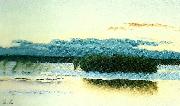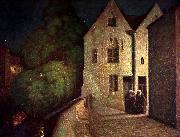Wholesale Oil Painting No Minimum |
|||||||||||
|
|
|||||||||||

|
|||||||||||
|
|
|
||||||||
bruno liljeforsBruno Andreas Liljefors (1860-1939) was a Swedish artist, the most important and probably the most influential wildlife painter of the late nineteenth and early twentieth century.[1] He also drew some sequential picture stories, making him one of the early Swedish comic creators. Liljefors is held in high esteem by painters of wildlife and is acknowledged as an influence, for example, by American wildlife artist Bob Kuhn.[1] All his life Liljefors was a hunter, and he often painted predator-prey action, the hunts engaged between fox and hare, sea eagle and eider, and goshawk and black grouse serving as prime examples.[1] However, he never exaggerated the ferocity of the predator or the pathos of the prey, and his pictures are devoid of sentimentality. The influence of the Impressionists can be seen in his attention to the effects of environment and light, and later that of Art Nouveau in his Mallards, Evening of 1901, in which the pattern of the low sunlight on the water looks like leopardskin, hence the Swedish nickname Panterfällen.[1] Bruno was fascinated by the patterns to be found in nature, and he often made art out of the camouflage patterns of animals and birds. He particularly loved painting capercaillies against woodland, and his most successful painting of this subject is the largescale Capercaillie Lek, 1888, in which he captures the atmosphere of the forest at dawn. He was also influenced by Japanese art, for example in his Goldfinches of the late 1880s.[1] During the last years of the nineteenth century, a brooding element entered his work, perhaps the result of turmoil in his private life, as he left his wife, Anna, and took up with her younger sister, Signe, and was often short of money.[1] This darker quality in his paintings gradually began to attract interest and he had paintings exhibited at the Paris Salon. He amassed a collection of animals to act as his living models. Ernst Malmberg recalled: The animals seemed to have an instinctive trust and actual attraction to him...There in his animal enclosure, we saw his inevitable power over its many residents??foxes, badgers, hares, squirrels, weasels, an eagle, eagle owl, hawk, capercaillie and black game.[1] The greatness of Liljefors lay in his ability to show animals in their environment.[1] Sometimes he achieved this through hunting and observation of the living animal, and sometimes he used dead animals: for example his Hawk and Black Game, painted in the winter of 1883-4, was based on dead specimens, but he also used his memory of the flocks of black grouse in the meadows around a cottage he once lived in at Ehrentuna, near Uppsala. He wrote: The hawk model??a young one??I killed myself. Everything was painted out of doors as was usually done in those days. It was a great deal of work trying to position the dead hawk and the grouse among the bushes that I bent in such a way as to make it seem lively, although the whole thing was in actuality a still life.[1] |
||||||||
|
|
||||||||
afton
afton Painting ID:: 65111 |
olja pa duk, 17.5x32cm
se olja pa duk, 17.5x32cm se |
|||||||
|
|
||||||||
anders trulson1874-1911 Anders Trulson, född 14 juli 1874 i Tosterup, död 23 augusti 1911 i Italien, var en svensk konstnär. Anders Trulson föddes i Tosterup, där fadern var kusk på ett gods. Han fick sin utbildning i Köpenhamn och Stockholm, och blev enligt flera en dansksvensk blandning. Han bodde flera år i Lund innan hans utlandsresor började 1905, bland annat till Paris och Bregge. Trulson dog 1911 bara 37 år gammal på resa i Italien. 1902 var han med och grundade Skånska konstnärslaget som tillsammans med Konstföreningen för södra Sverige var centrum för det skånska konstlivet. Skånes konststil och liv var till stor del utanför övriga Sveriges, inte minst landskapsmåleriet vilket var präglat av ett eget färgspel. |
||||||||
|
|
||||||||
|
|
afton
afton Painting ID:: 69965 |
se se |
||||||
|
|
||||||||
|
anders trulson 1874-1911 Anders Trulson, född 14 juli 1874 i Tosterup, död 23 augusti 1911 i Italien, var en svensk konstnär. Anders Trulson föddes i Tosterup, där fadern var kusk på ett gods. Han fick sin utbildning i Köpenhamn och Stockholm, och blev enligt flera en dansksvensk blandning. Han bodde flera år i Lund innan hans utlandsresor började 1905, bland annat till Paris och Bregge. Trulson dog 1911 bara 37 år gammal på resa i Italien. 1902 var han med och grundade Skånska konstnärslaget som tillsammans med Konstföreningen för södra Sverige var centrum för det skånska konstlivet. Skånes konststil och liv var till stor del utanför övriga Sveriges, inte minst landskapsmåleriet vilket var präglat av ett eget färgspel. afton se |
||||||||
|
|
||||||||
|
Prev Next
|
||||||||
|
|
||||||||
|
Related Paintings to anders trulson :. |
||||||||
|
|
||||||||
|
CONTACT US |


